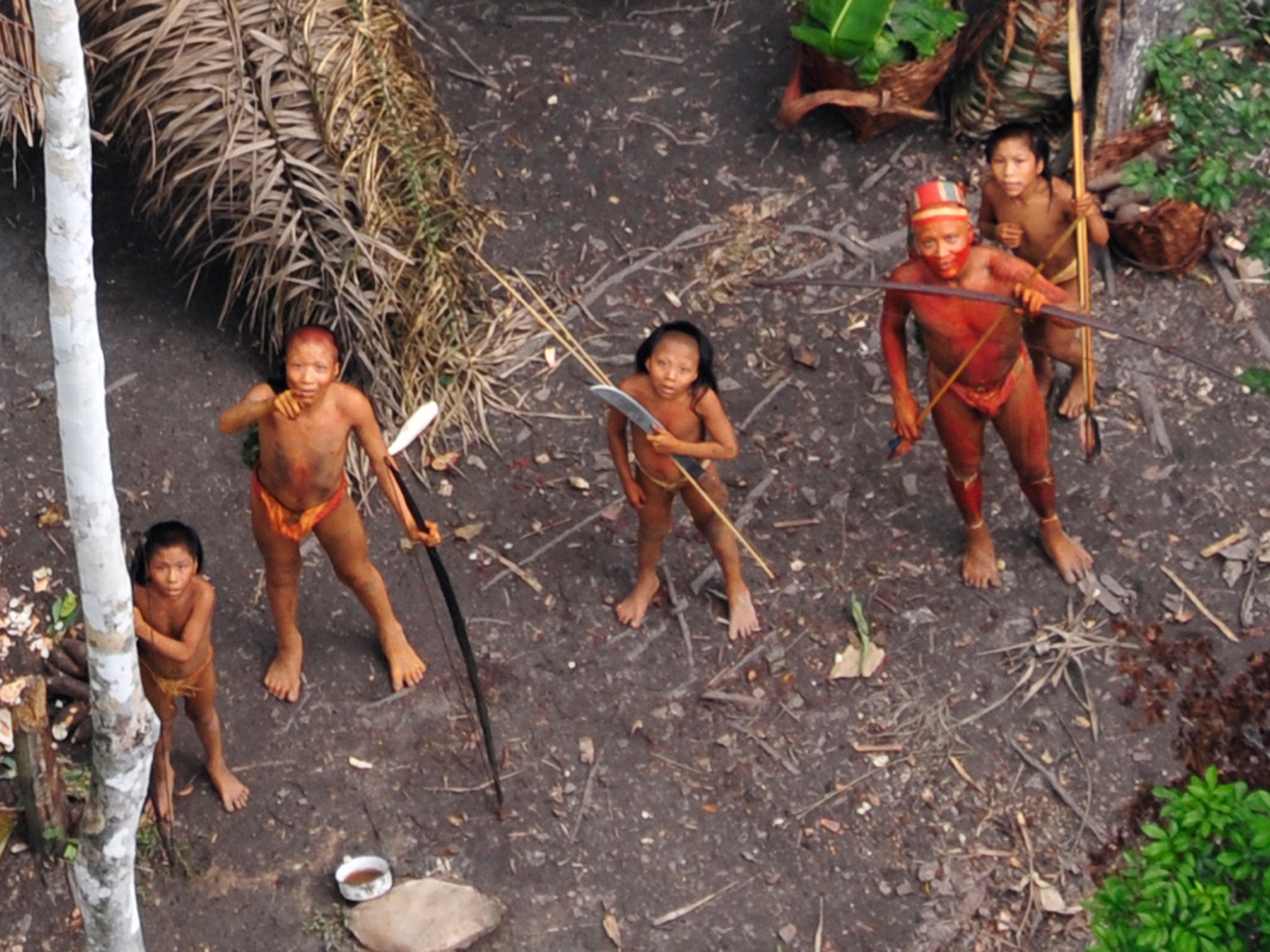Forced contact with Amazon people would be 'genocide', tribe warns
Survival International tells The Independent other tribes, who have themselves experienced the dangers of 'first contact', are protecting uncontacted groups against the plans of 'some anthropologists in another country'

Unsullied by the trappings of the modern world and cut off from the rest of humanity, the “uncontacted” peoples of the Amazon are seen as offering a fascinating insight into a prehistoric world.
This romantic view of the most remote native communities in the world is what two leading US anthropologists have spent the last two years trying to deconstruct.
Professors Kim Hill and Robert Walker say it is an “illusion” to protect these people by leaving them alone, and that a controlled programme of forced contact is the only way to save them from the threats of illegal loggers, mining prospectors and diseases to which they have no immunity.
Now, the charity whose campaigns helped bring the plight of these people to international attention says the idea of forced contact has been rejected – by the indigenous tribes themselves.
Survival International has released a video created by the Guajajara tribe, whose lands in northeast Brazil include groups of uncontacted people, which warns that the plan produced by “some anthropologists in another country” would lead to “another genocide of indigenous people”.
Speaking to The Independent, Survival International’s campaign director Fiona Watson said the Guajajara were “taking matters into their own hands in the absence of the state”, protecting uncontacted groups as the reach of deforestation stretches further and further up the Amazon.
The charity has produced an open letter to Hill and Walker warning that forced contact would open up the indigenous people to new diseases, violence at the hands of better-armed outsiders and “the theft of their natural resources”.
And the Guajajara, who were themselves decimated by disease when they first came into contact with outsiders 100 years ago, were the best-placed people in the world to “know what is best” in turn for the tribes in their territory, Ms Watson said.
“Increasingly, indigenous peoples are speaking out in defence of uncontacted tribes, which has never been the case before,” Ms Watson said.
Hill and Walker’s proposal – to instigate contact, educate and inoculate the tribes before they have a chance to clash with illegal intruders – is the equivalent of “playing God”, she said.
“In some of the contacts in the past, up to 90 per cent [of indigenous people] have died within the first year,” Ms Watson said. “Even when it is around 50 per cent, that is a huge amount of people to lose.
“There was a good example of this recently when two women from the Awa tribe made contact because there were loggers nearby. Even with the best medical care and people there to help treat them, they nearly died from tuberculosis.
“You cannot guarantee a similar thing won’t happen [with forced contact], it is highly irresponsible.”
Ms Watson said experts with the Brazilian government, which in 1987 instigated the policy of total non-contact and enshrined the rights of the indigenous tribes to their land in the constitution, still believed it was the best way forward. In recent years the number of distinct isolated groups has risen from 100 to 107.
In pictures: The uncontacted tribes of the Amazon
Show all 7The crux of Hill and Walker’s argument, set out in an impassioned editorial in Science last year, was that contact of some form or another was unavoidable, making it sensible to try and instigate it in as controlled a manner as possible.
“There is no such thing as a group that remains in isolation because they think it’s cool to not have contact with anyone else on the planet,” Professor Hill said, arguing that most tribal peoples were interesting in making contact with the outside world but too afraid to do so.
Campaigners are not labouring under the illusion that the tribes are living in some sort of pre-mechanised paradise, Ms Watson said.
“But it goes down to the question of rights. There’s lots of evidence to show that the uncontacted tribes are rejecting contact, and with tribes like the Awa who were first contacted in the seventies, plenty have said to me that they think it would have been better if they stayed in the forest.
“They are not some prehistoric throwback. They are contemporary people who have decided they want to live their way, and that is their choice.”
Subscribe to Independent Premium to bookmark this article
Want to bookmark your favourite articles and stories to read or reference later? Start your Independent Premium subscription today.

Join our commenting forum
Join thought-provoking conversations, follow other Independent readers and see their replies